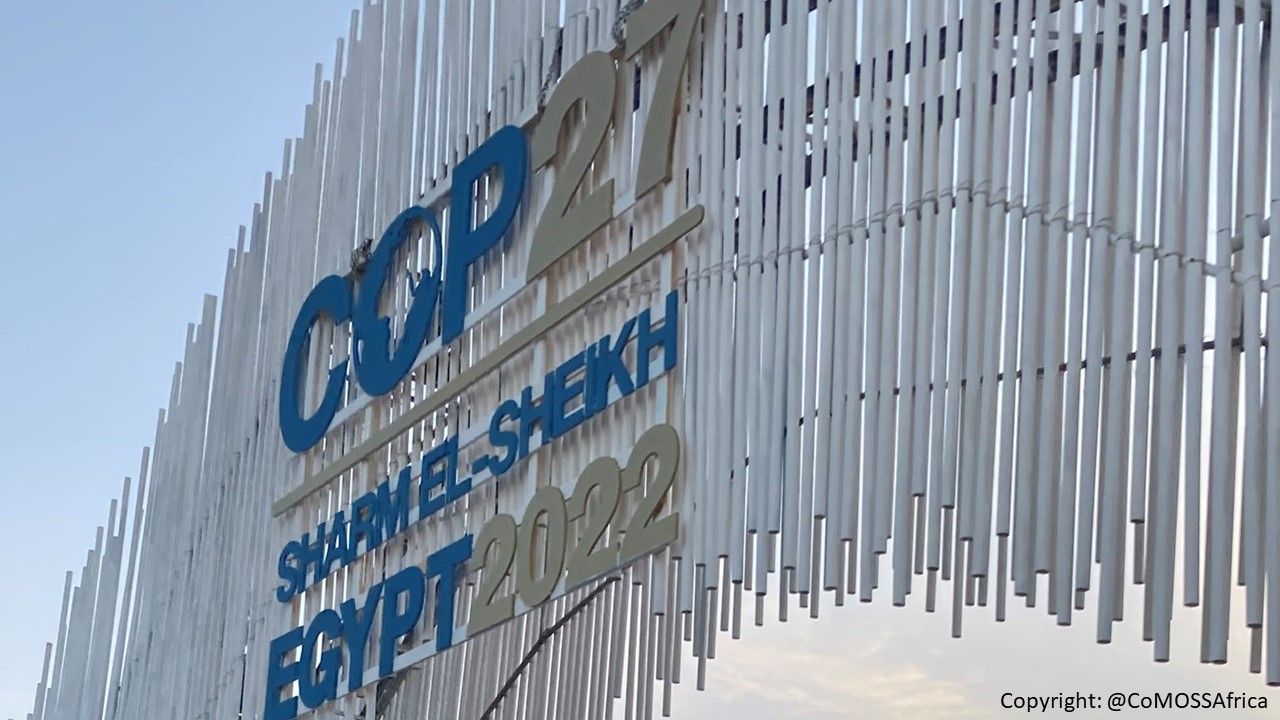Key Energy Outcomes from COP27

On 7-18 November, climate and energy actors from around the globe convened for the 27th Conference of the Parties (COP27) in Sharm El-Sheikh, Egypt. COP27 was an opportunity to unite African voices and showcase the continents’ climate action through a variety of announcements. Below we present the key energy outcomes from COP27, relevant for Africa and Europe.
8 November – World Leaders Summit
During the world leaders’ summit, the European Union (EU) highlighted the implementation of the “Africa – EU Green Energy initiative” (AEGEI). The initiative aims to support Africa’s green transition in the energy sector by increasing renewable energy capacity, increasing access to affordable and reliable energy for all Africans and promoting sustainable energy use. High-level policy makers also gathered to discuss how to build a conducive environment to sustainable finance in Africa and build green bond markets through the Global Gateway at the EU Pavilion.
9 November – Finance Day
The African Union Commission (AUC) and the International Energy Agency (IEA) hosted a high-Level Forum on “Financing Energy Transition in Africa”. Panelists deliberated on the critical energy issues facing Africa and ways to mobilise adequate finance to accelerate energy access and energy security on the Continent.
COP27 Presidency launches the Sharm-El-Sheikh Adaptation Agenda. The agenda outlines 30 Adaptation Outcomes to enhance resilience for 4 billion people living in the most climate vulnerable communities by 2030. The publication also emphasises the urgency for counting with evidence-based, actionable adaptation plans for all actors, making climate risks visible and accessible, and the deployment of locally-led adaptation principles.
The African Union Commission (AUC), African Development Bank (AfDB), the United Nations Economic Commission for Africa (UNECA), and the New Partnership for Africa’s Development (NEPAD) organised an “Africa Day” at the COP27. The event provided countries and development partners, the opportunity to highlight measures to tap into the continent’s potential and to mobilise internal and external resources to tackle climate change.
11 November – Decarbonisation Day
Team Europe hosted the Desert to Power panel focusing on how the EU Global Gateway initiatives support transforming the to turn the Sahel region into a renewable energy powerhouse and move from fragility to resilience. The panel showcased the African Development Bank (AfDB)-led “Desert to Power Initiative”, which aims to increase solar generation capacity to provide 250 million people with electricity access across Africa’s Sahel region.
The African Union (AU), the AfDB and Africa50, alongside multiple global partners launched the ”Alliance for Green Infrastructure in Africa” (AGIA), an initiative to help scale and accelerate financing for green infrastructure projects in Africa. The Alliance’s mission is to raise significant capital to accelerate Africa’s just and equitable transition to Net Zero emissions. It has two strategic objectives. The first is to generate a robust pipeline of bankable projects. The second is to catalyse financing at scale and speed for Africa’s infrastructure.
15 November – Energy Day
The Federal Ministry for Economic Cooperation and Development (BMZ) hosted an event at German Pavilion on “Accelerating the Energy Transition in Africa”, which brought together stakeholders from government, the private sector and civil society to discuss challenges and solutions for the acceleration of the energy transition on the African continent.
The African Pavilion offered a platform to garner support and advocacy for the African Single Electricity Market (AfSEM) and the Continental Power System Master Plan (CMP) during the event Global Energy Crisis and Security: Opportunities to Accelerate AfSEM and CMP event. Hosted by the AUC, AUDA-NEPAD, AFREC, the AfDB, and the EC, the event convened African energy development stakeholders, and continental and international partners to explore and discuss the best ways to accelerate the formulation, implementation and operationalisation of AfSEM and CMP.
The COP27 Egyptian Presidency launched the Africa Just and Affordable Energy Transition Initiative (AJAETI). By 2027, its three primary objectives are to offer technical and policy support to facilitate affordable energy for at least 300 million people in Africa; provide access to clean cooking fuels and technologies; and increase the share of renewable electricity generation by 25%.
16 November – Biodiversity Day
A high-level panel discussion on adaptation and resilience in Africa hosted by Africa and Europe launched the newly developed Team Europe Initiative (TEI) on Climate Change Adaptation and Resilience in Africa as part of the EU-Africa Global Gateway Investment Package. This Team Europe Initiative will bring together existing and new climate change adaptation programmes of over €1 billion and leverage its impact by improved coordination and a reinforced policy dialogue on adaptation between the EU and AU.
Governments representing over half of global GDP presented a 12-month action plan to help make clean technologies cheaper and more accessible everywhere. Under the ‘Breakthrough Agenda’ countries launched a package of 25 new collaborative actions in five key areas: power, road transport, steel, hydrogen and agriculture. Financial announcements included a USD 410m green hydrogen investment in Egypt led by the EBRD and a USD 1.6bn green hydrogen global programme by the World Bank.
Learn more about the outcomes from COP27, and the opportunities it brought to recalibrate the energy partnership between Africa and Europe by joining the AEEP Energy Talks on 6 December:





